Getting your Trinity Audio player ready...
The Republican Party formally nominated President Donald Trump for a second term in the White House Monday, and then Trump delivered a long and extraordinary speech in which he cast great doubt on the integrity of the election he was nominated to compete in.
"The only way they can take this election away from us is if this is a rigged election," Trump said as he made an unscheduled appearance at the party's scaled-down convention. The convention kicked off with a day of "official business" in Charlotte before moving to Washington, D.C. for prime-time programming.
8 View gallery
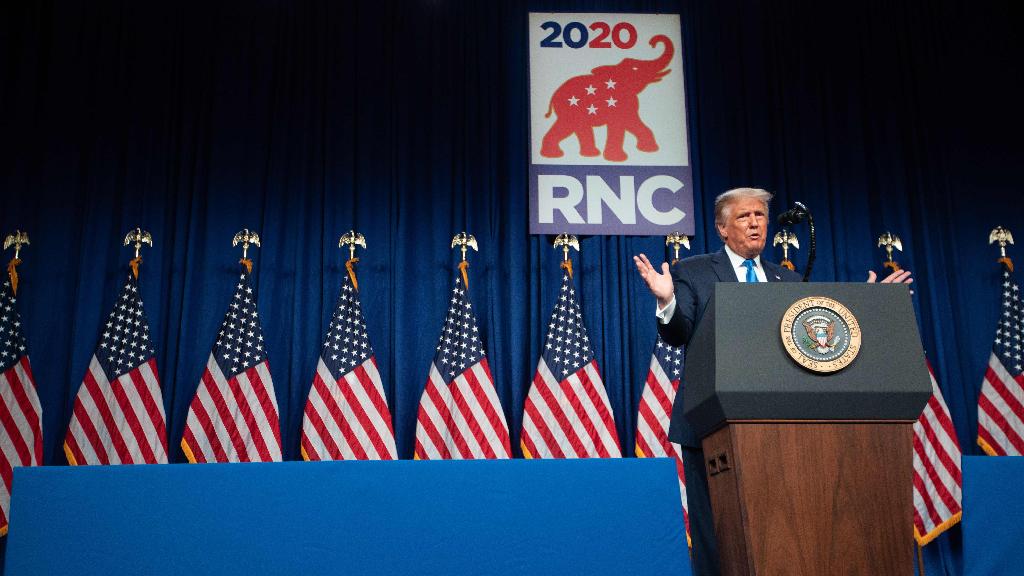

U.S. President Donald Trump speaks during the first day of the Republican National Convention
(Photo: AFP)
Trump formally secured the votes he will need to claim the party's renomination in North Carolina, where party members are meeting amid a coronavirus pandemic that has killed more than 176,000 Americans, erased millions of jobs and eroded the president's standing among voters.
In a nearly hour-long speech, Trump once again sowed doubts about the integrity of November's election as he laced into mail-in voting, which experts say has proven remarkably safe.
"Be very very careful," he told the crowd as he concluded. "This is the most important election in the history of the country. Don't let them take it away from you."
Trump also panned the state's Democratic governor for restrictions put in place to try to prevent the spread of the virus. Trump accused Gov. Roy Cooper of "being in a total shutdown mode," and claimed the restrictions were aimed at trying to hurt his campaign.
8 View gallery
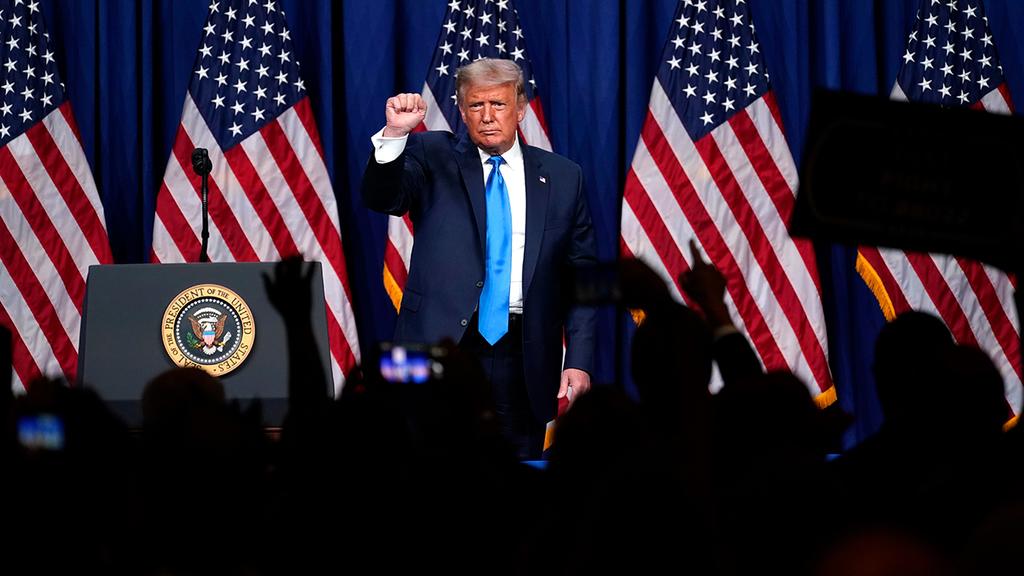

U.S. President Donald Trump speaks during the first day of the Republican National Convention
(Photo: AP)
The partly virtual, partly in-person extravaganza studded with Trump family members will feature the president speaking every day, even as protesters target the convention site. It marked a contrast with Democrats, who opted for a entirely virtual format to nominate Biden, a former vice president, and running mate Senator Kamala Harris. That change was intended to reduce the risk of the virus being spread at the political event.
"The choice in this election has never been clearer, and the stakes have never been higher," Vice President Mike Pence told attendees at the start of the Republican convention.
Biden, 77, is leading Trump, 74, in opinion polls ahead of the Nov. 3 election. Biden and his fellow Democrats portrayed Trump as a force for darkness, chaos and incompetence, while stressing the Democrats' diversity and values like "empathy" and "unity."
8 View gallery
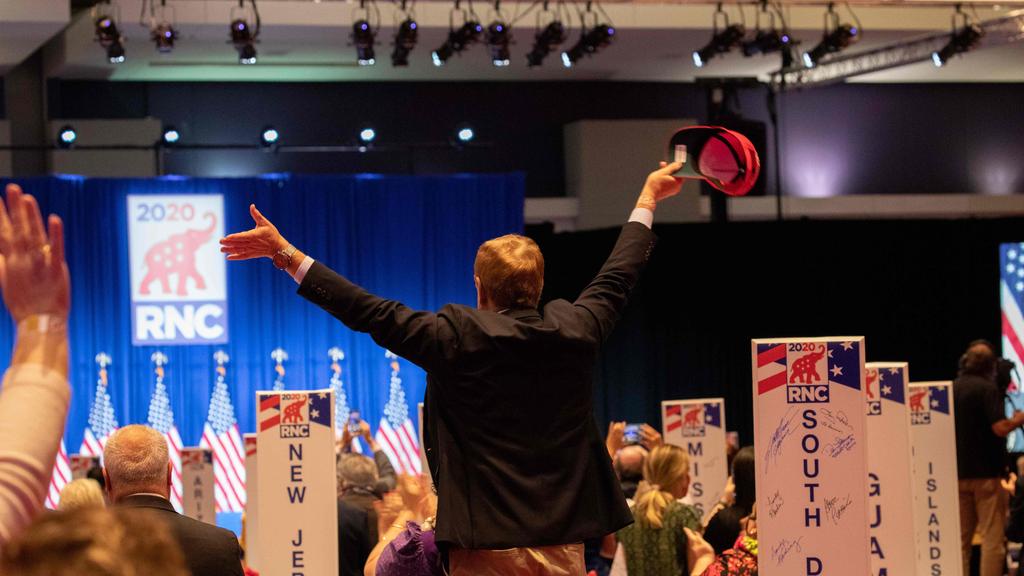

Delegates react as US President Donald Trump speaks during the first day of the Republican National Convention
(Photo: AFP)
Republicans said their convention would offer a more hopeful message, with an emphasis on "law and order," gun rights, tax cuts and the "forgotten" men and women of America.
Republicans opted not to vote on a traditional platform document detailing their policy goals, instead saying that it supports what Trump is doing. Trump's campaign released a series of bullet-point goals, including a promise to "create 10 million new jobs in 10 months."
In another contrast with the Democratic event, which featured all three living former Democratic presidents, and prior nominees, the Republican event will not include speeches from that party's past living president or candidates.
8 View gallery
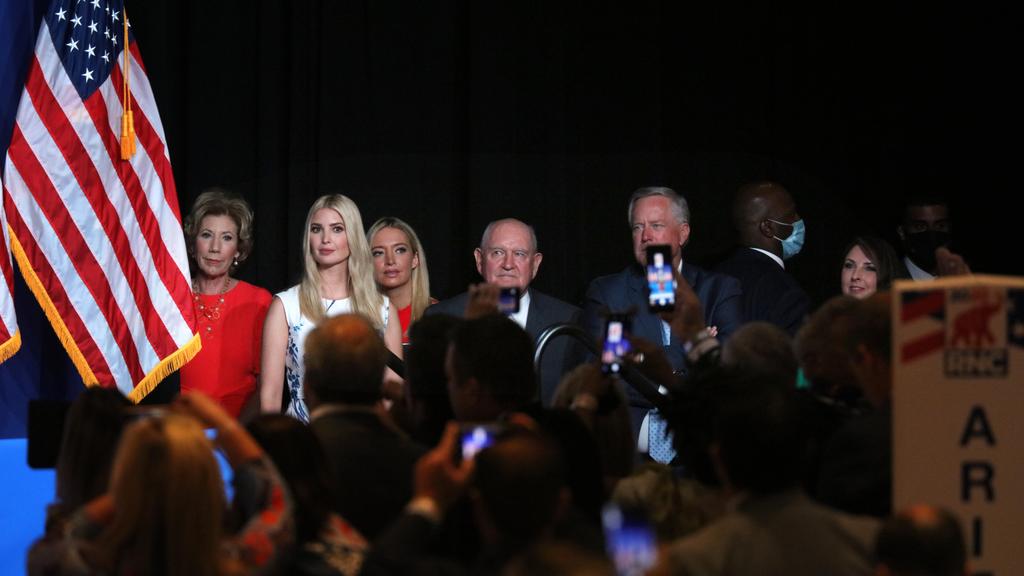

White House staff listen as President Trump speaks to delegates in the Charlotte Convention Center’s Richardson Ballroom in Charlotte
(Photo: EPA)
Neither former President George W. Bush nor 2012 Republican presidential nominee Senator Mitt Romney, who voted to convict Trump at the president's impeachment trial, plan to speak. Also absent from the schedule are several Republicans facing close elections in November, including Senator Thom Tillis of North Carolina.
With the pandemic not yet under control, good news has been in short supply for Trump. His performance as president was sharply criticized by Biden and former President Barack Obama at the Democratic convention.
Biden's campaign said Trump would attempt to change the subject, delivering "more desperate, wild-eyed lies and toxic division, in vain attempts to distract from his mismanagement," according to spokesman Andrew Bates.
8 View gallery
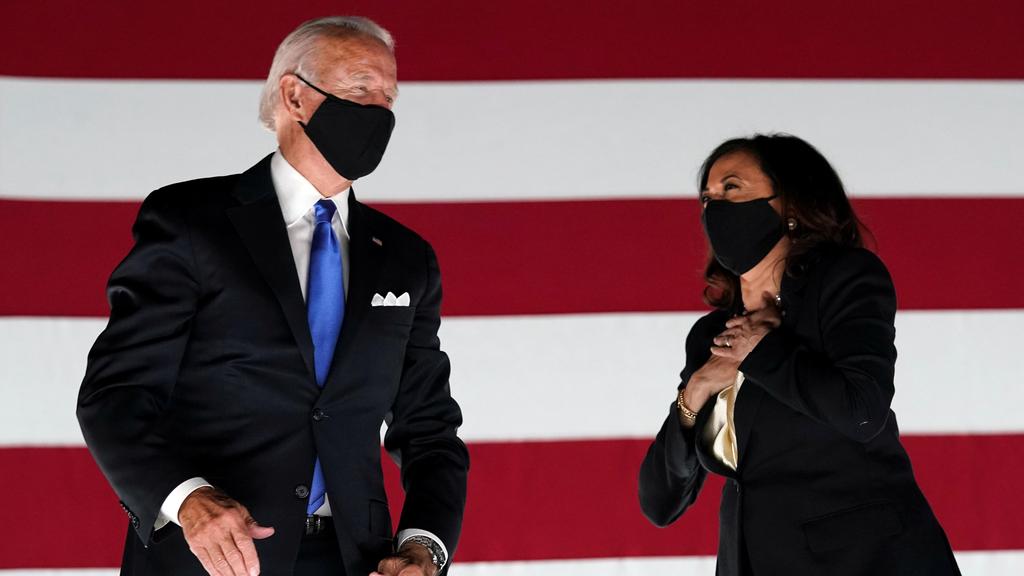

Democratic presidential candidate and former Vice President Joe Biden and U.S. Senator and Democratic candidate for Vice President Kamala Harris celebrate after Joe Biden accepted the 2020 Democratic presidential nomination
(Photo: Reuters)
"What they won't hear is what American families have urgently needed and been forced to go without for over seven consecutive months: any coherent strategy for defeating the pandemic."
The president, a former reality television star, plans to hold several live events with in-person audiences during the Republican convention, in contrast to Democrats, who showed pre-taped segments or delivered speeches in mostly empty venues to prevent the spread of the coronavirus.
Trump traveled on Monday to North Carolina, the venue for the scaled-back event. Trump's planned daily speeches are a break with the tradition of the nominee keeping a low profile before an acceptance speech on the convention's final night.
8 View gallery
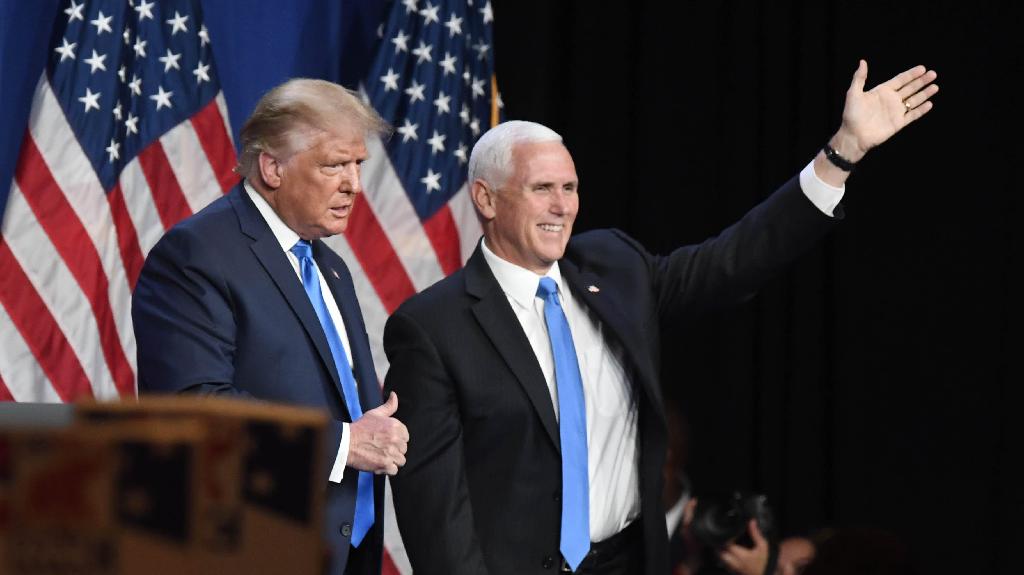

President Donald J. Trump and Vice President Mike R. Pence greet the Republican National Convention
(Photo: TNS)
During the roll-call vote on Trump's renomination, David Bossie, a longtime Republican operative who announced Maryland's nomination vote, in an apparent slip-up described his state as "home of the Underground Railroad, and two of our greatest segrega-, abolitionists, Frederick Douglass and Harriet Tubman."
Overnight, demonstrators and law enforcement clashed for a third straight night near the Charlotte Convention Center with police using pepper spray on the crowd. The Charlotte-Mecklenburg Police Department said in a statement that officers arrested five people late on Sunday.
On Tuesday, Trump's wife, Melania, will give a speech from the White House, while Pence follows on Wednesday from Baltimore's Fort McHenry historic site.
8 View gallery
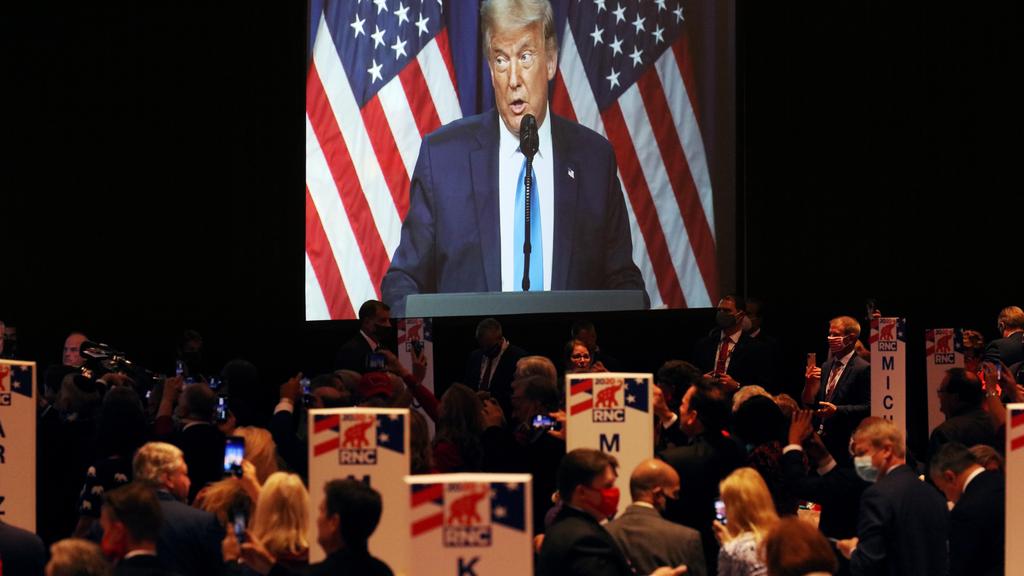

Delegates and RNC staff listen as President Trump speaks in the Charlotte Convention Center’s Richardson Ballroom in Charlotte
(Photo: EPA)
Trump will accept his party's nomination on Thursday night before a crowd on the White House South Lawn. Democrats have criticized the move as a partisan use of public property.
"Trump has four days to make two cases: One is 'we know what we are doing and have done a great job, obviously interrupted by the virus,'" said Constantin Querard, president of Grassroots Partners, an Arizona-based conservative political consultancy.
"And then you have to knock the Democratic ticket for being as far-left as they are," he said.
8 View gallery
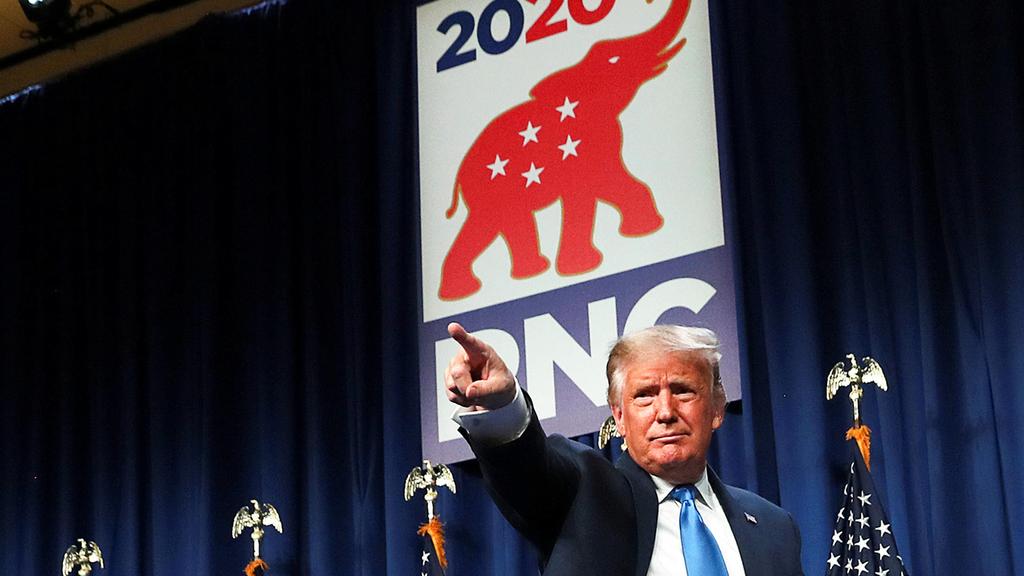

U.S. President Donald Trump speaks during the first day of the Republican National Convention
(Photo: Reuters)
Trump, who uses pejorative nicknames to demean his opponents, previewed his attacks on Biden, whom he frequently derides as "Sleepy Joe," in a rebuttal address after the Democratic convention finished last week.
Peter Trubowitz, a professor at the U.S. center of the London School of Economics, said he expected Republicans to launch "a full-throated attack on Biden's fitness to be president" throughout the convention.
"It will be less about his age ... and more about questioning his 'independence' from Democratic constituencies that the Trump campaign is defining as 'radical,' 'socialist,' and a threat to law and order,'" he wrote.

